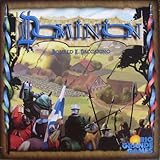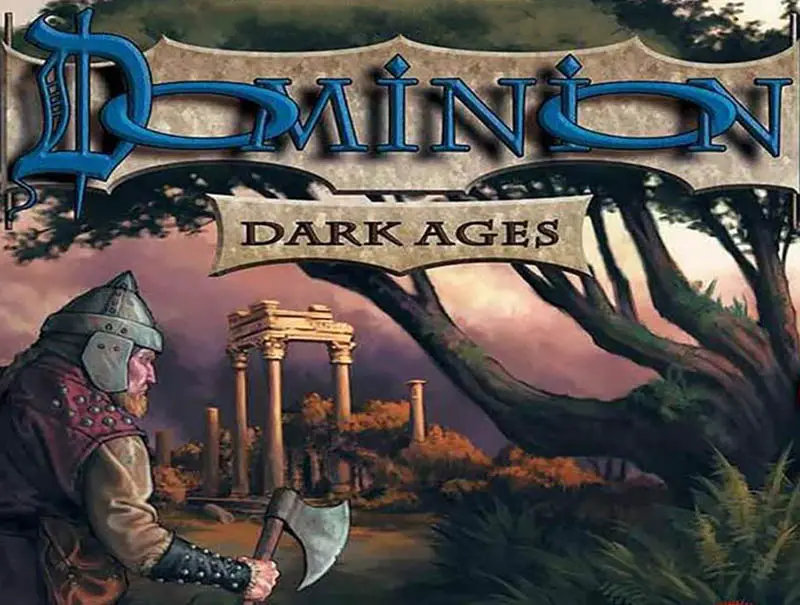
Times have been hard. To save on money, you've moved out of your old castle, and into a luxurious ravine. You didn't like that castle anyway; it was always getting looted, and never at a reasonable hour.
And if it wasn't barbarians it was the plague, or sometimes both would come at once, and there wouldn't be enough chairs.
The ravine is great; you get lots of sun, and you can just drop garbage wherever you want. In your free time you've taken up begging. Begging is brilliant conceptually, but tricky in practice, since no-one has any money.
You beg twigs from the villagers, and they beg them back, but no-one really seems to come out ahead. That's just how life is sometimes.
You're quietly conquering people, minding your own business, when suddenly there's a plague, or barbarians, or everyone's illiterate, and it's all you can do to cling to some wreckage as the storm passes through. Still, you are sure that, as always, you will triumph over this adversity, or at least do slightly better than everyone else.
Components
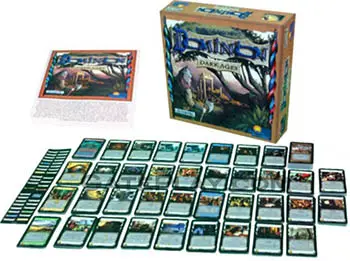
- 330 Action cards
- 10 Treasure cards
- 12 Victory cards
- 20 Action cards
- 10 Knight cards
- 35 Randomizer cards
- 50 Ruins cards
- 18 Shelter cards
Setup
Before the first game, remove the three sets of cards from their wrappings and place them in the card tray. The included inlay suggests a way to organize the cards.
Dark Ages includes 35 randomizer cards (one for each Kingdom card in Dark Ages). Players will need the Treasure cards, Victory cards, Curse cards, and Trash card from Dominion, a standalone expansion (e.g., Dominion: Intrigue), or Dominion: Base Cards to play with this expansion.
As with previous Dominion games, players must choose 10 sets of Kingdom cards for each game. If players choose the random approach for choosing sets, they should shuffle the randomizer cards from this expansion with those of any other Dominion games they choose to play with.
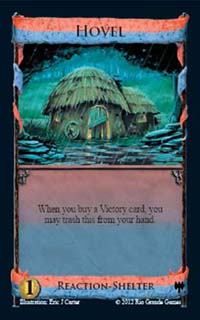
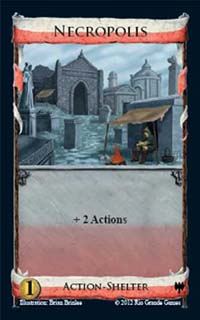
If only Kingdom cards from Dark Ages are being used this game, the Shelter cards replace starting Estates - each player's starting deck is seven Coppers, a Hovel, a Necropolis, and an Overgrown Estate. If a mix of Kingdom cards from Dark Ages and other sets is being used, then the use of Shelters should be determined randomly, based on the proportion of Dark Ages cards in use.
For example, choose a random Kingdom card being used - such as the last card dealt from the Randomizer deck - and if it is from Dark Ages, use Shelters in place of starting Estates. Do not use the same card to choose whether or not to use Shelters as you use to choose whether or not to use Platinum and Colony (from Prosperity). Using Shelters does not change the Estate Supply pile; it still contains 8 Estates for 2 players and 12 Estates for 3 or more players.
If any Kingdom card has the type Looter (e.g. Cultist, Death Cart, and Marauder), add the Ruins pile to this game. Shuffle the Ruins cards, then count 10 per player after the first: 10 for two players, 20 for three players, 30 for four players, and so on.
Put the pile face down with the top card face up. Return any remaining Ruins cards to the box as they are not used in this game. If the Knights Kingdom card pile is being used, shuffle the Knights before the game, and place the pile face down with the top card face up. The pile does not get a token for Trade Route (from Prosperity), even if the top Knight is a Victory card.
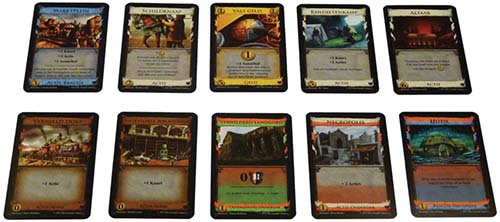
General Rules
Playing an Action card means both to put it face-up into the play area, and then to follow the instructions on it. If the card cannot be moved into the play area, the instructions on it are still followed.
In Play
Action cards and Treasure cards played face-up into a play area are in play until they are moved somewhere else-usually until they are discarded during the Clean-up phase. Only played cards are in play; set aside cards, trashed cards, cards in the Supply, and cards in hands, decks, and discard piles are not in play. Reaction abilities like the Beggar's do not put those cards into play.
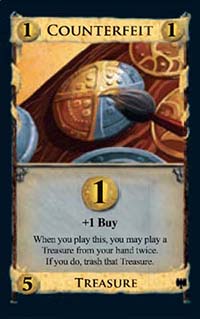
Dark Ages includes two Treasure cards with rules on them. The Counterfeit card is in the Supply when selected as one of the 10 Kingdom cards for the game; the Spoils card is not part of the Supply and in only included when the Bandit Camp, Marauder, or Pillage cards are in the game. They are not part of the Basic Supply.
They are just like normal Treasures, but have special abilities. They are played during the Buy phase like normal Treasures, and are affected by cards that refer to Treasures.
A player may play his Treasure cards in any order, and may choose not to play some (or even all) of the Treasure cards he has in his hand. During the Buy phase, a player must play all of the Treasures he wishes to play before he buys any cards, even if he has +Buys; he cannot play more Treasures after Buying a card.
When two things happen to a player at the same time, that player picks the order to do them. For example, if a player's Rats are trashed and he has Market Square in hand, he can choose whether to resolve the Rats' "when-trashed" ability first, or Market Square's reaction first.
When two things happen to different players at the same time, the players go in turn order, starting with the player whose turn it is. For example, when a player plays Marauder, the other players gain Ruins cards in turn order.
If a player has to do anything with his Deck (draw, reveal, set aside, look at, or trash cards) and he needs more cards than are remaining in his Deck, he sets aside the rest of his Deck, shuffles his Discard pile to form a new Deck, and then does the thing with the set aside cards plus however many cards are still needed from his newly shuffled Deck.
If there still are not enough cards, he does the thing with however many cards he can. If a player's Deck is empty, he does not shuffle his Discard pile until he needs to do something with cards from his Deck and cannot.
Players may reveal multiple Reaction cards in response to a single event. Each Reaction card is revealed and resolved before another Reaction card is revealed.
The second Reaction card can be one that was not initially in hand when the first Reaction card was played. For example, a player could reveal Secret Chamber (from Intrigue) in response to an Attack card and draw a Beggar. After the player has completely resolved the Secret Chamber, he can then reveal the Beggar in response to the same Attack card.
In rare circumstances an effect may try to move a card that is not where that effect expects the card to be. In those cases the card does not move - the effect has "lost track" of the card. Losing track of a card prevents it from being moved, but does not stop anything else from happening.
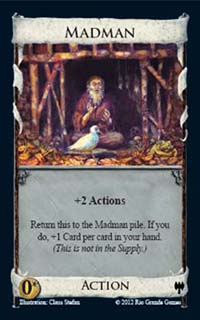
For example, if you Procession a Madman, Procession first puts Madman in play; then you resolve Madman, getting +2 Actions and drawing cards and returning Madman to the Madman pile; then Procession fails to put Madman into play again, because Procession expects to find Madman in play, but it is not there, it's in the Madman pile; then you resolve Madman again, only getting +2 Actions this time, since it says "if you do" before the card-drawing, and you did not actually return it to the Madman pile this time; then Procession fails to trash Madman since Procession again expects to find Madman in play and it is not there; and then you gain an Action costing  if you can.
if you can.
Cards do not lose track of cards that they move, only cards that other cards move. For example when Procession puts Madman into play, that does not cause Procession to lose track of Madman; it is Madman moving itself that causes Procession to lose track of it. Things lose track of a card if something moves it, if it is the top card of a deck and gets covered up, or if it is the top card of a discard pile and gets covered up.
When a card is gained to a location other than a discard pile, it does not "visit" the discard pile - it goes directly to where it was gained. For example Armory gains cards directly to the top of a deck.
Additional Rules
Read here for additional rules of Dark Ages.
Review
Read here a review of Dominion: Dark Ages.
Dark Ages Cards
Quick overview of the Dark Ages Cards.
Dark Ages Kingdom Card Descriptions.
Continue Reading
